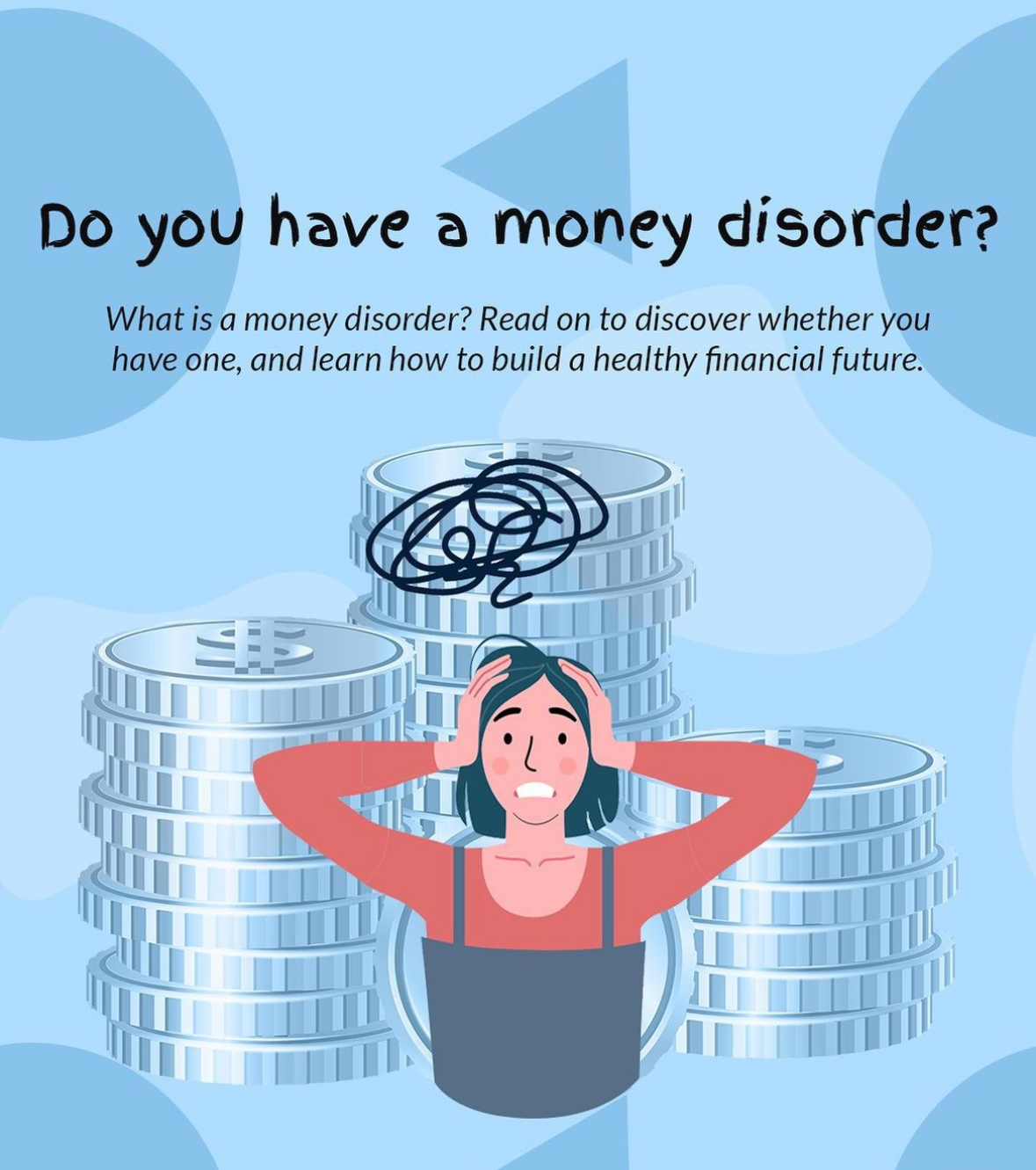Do you have a money disorder?
The hidden patterns of dysfunctional money behaviours and their effects on your relationships and financial stability.

Money plays an important role in our lives. It’s necessary for us to meet our basic needs, pursue our dreams, and live a comfortable life.
However, just like our relationships with people, one’s relationship with money may not always healthy. Many of us may be struggling with money disorders that can threaten our financial health and well-being.
What Are Money Disorders
A money disorder is not a formal medical diagnosis, but a term used to describe certain behaviors and thought patterns that revolve around money.
They are predictable, often rigid patterns of self-destructive financial behaviour that causes significant stress, anxiety and emotional distress.
In his book “Mind Over Money: Overcoming the Money Disorders That Threaten Our Financial Health,” financial psychologist Brad Klontz identifies 12 money disorders that can impact our financial lives.
So, what exactly are the signs and symptoms of a money disorder? Here’s a closer look at them and how they can affect us.
Money Avoidance
Money avoidance is characterised by a fear of money or a lack of interest in managing it. People with this disorder may avoid checking their bank accounts, paying bills, discussing finances with their partners, or investing in their future, which can lead to future financial problems.
There are four main types of money avoidance disorders.
1. Financial denial
Individuals who have financial denial avoid all reminders of their money problems. This is often caused by an income loss or overwhelming amount of debt to pay off. Signs and symptoms of this money disorder include not checking bank accounts, ignoring credit card statements, and neglecting paying bills.
2. Financial rejection
Not to be confused with financial denial, individuals who have financial rejection often feel guilty for earning money. They deliberately make non-financially-savvy decisions, including never asking for a raise or not investing in long-term assets. They may also give money away to family and friends to avoid negative feelings for themselves out of compulsion.
3. Underspending
Underspenders typically have a lot of cash savings built up but keep themselves emotionally and exponentially poor by never allowing themselves to enjoy any of their savings. This lack of spending is unconscious and mainly due to lingering anxiety and fear of losing everything.
4. Excessive risk aversion
Another common money worship disorder is excessive risk aversion. Just like its name, individuals who have excessive risk aversion have an irrational unwillingness and/or fear of taking risks.
Photo by Luis Villasmil on Unsplash
2. Money Worship
Money worship is a belief that money is the key to happiness and success. People with this disorder may prioritise money over other aspects of their lives, such as relationships or personal fulfillment.
They often believe money will solve all their problems, seeking excessive wealth and possessions, and sacrificing their relationships and health to achieve financial success.
There are four main types of money worship disorders.
1. Hoarding
Hoarding disorder is a psychological condition that can extend to money. Individuals with this disorder tend to accumulate large amounts of money, even if they don’t need it. This behaviour can cause people to miss out on opportunities to invest or save money.
2. Unreasonable risk taking
Unreasonable risk taking is another manifestation of money worship disorder, in which an individual takes financial risks that are beyond his means or knowledge in pursuit of greater financial gain. This can include investing in high-risk stocks or ventures without doing proper research or engaging in speculative or fraudulent schemes.
3. Workaholism
A workaholic is one who is obsessed with work and career advancement to the point of neglecting relationships, health, and personal interests. This behaviour is often driven by the belief that financial success and material possessions are keys to happiness and fulfillment. It is especially commonly seen now in our era of hustle culture.
4. Overspending
Often caused by past trauma, people with an overspending disorder believe their self-worth is directly tied to their net worth. They spend money on high status symbols and get into debt to maintain an image of wealth and success and/or to achieve feelings of comfort and affection.
Relational Money Disorders
Relational money disorders refer to dysfunctional patterns of behavior related to money that are often learned within relationships. This disorder can manifest in four different ways as identified by Klontz in his book.
1. Financial infidelity
People with financial infidelity deliberately keep their spending habits a secret from their partner, such as hiding debt or making large purchases without their partner’s knowledge. This can lead to feelings of betrayal and damage trust in a relationship.
2. Financial incest
People with this disorder have an inappropriate financial relationship with family members, such as borrowing money from children or using financial leverage to control or manipulate others.
3. Financial enabling
Another common relational money disorder is financial enabling. People with this disorder enable others to continue with destructive financial behaviour, regardless whether they themselves can afford to. For example, a poor parent may continue to give money to an adult child who struggles with addiction or overspending, rather than helping him seek professional support.
4. Financial dependency
Often linked with financial enabling, people with this disorder rely on others like parents or partners, to manage their finances. They may struggle to take control of their financial lives or feel helpless when faced with financial decisions.
Start Managing Your Finances In A Healthy Way
Money disorders can affect anyone, with a significant impact on one’s financial stability and overall well-being. If you suspect that you have a money disorder through the signs and symptoms we listed above, it’s essential to seek help from your loved ones, support groups, or even self-help books.
While money is often perceived as a rational and objective topic, it is much more emotional than most people realise. In reality, our emotions play a significant role in how we handle our finances, from our spending habits to our investment decisions.
At the end of the day, it’s important to recognise the role that emotions play in our financial decisions and strive for a healthy balance between rationality and emotionality. By acknowledging and addressing our emotional responses to money, we can make more informed and fulfilling financial choices.
Secure your financial future today by building a healthy relationship with money, one step at a time.
If you ever need someone to speak to, to navigate through any financial mess you find yourself in, you may speak to our dedicated team on it.

